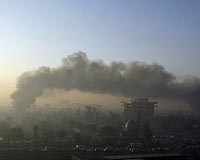| . |  |
. |
Baghdad (UPI) Apr 19, 2010 Concerns about the Iraqi armed forces' ability to maintain stability amid the political uncertainties triggered by the March 7 parliamentary elections have heightened the possibility the withdrawal of U.S. combat forces by August could be delayed. The loyalty and professionalism of the Iraqi armed forces and security services were found to be badly wanting in the horrendous sectarian bloodletting after the 2003 invasion. Whole battalions defected to the insurgency. But over the last two years or so, they have done a credible job in picking up the slack as U.S. military strength began to draw down. Last month, the size of the U.S. force in Iraq dropped to fewer than 100,000 for the first time since the March 2003 invasion. U.S. military strength peaked at 170,000 in 2007. After combat forces have been pulled out, some 50,000 U.S. troops will remain in training and advisory capacities and man several large base areas. A complete withdrawal is scheduled for the end of 2011. The main Iraqi political coalitions emerged virtually neck and neck in the March 7 elections, with neither having enough seats in the 325-seat parliament to win outright. The leaders, Prime Minister Nouri al-Maliki and former premier Iyad Allawi, are currently negotiating with other parties to form a government. But no viable coalition with the required strength has emerged and there are fears that al-Qaida and Shiite extremists could trigger nationwide upheaval amid the political uncertainty. "The problem is going to be in the struggle for the new government," says veteran Middle East military analyst Anthony Cordesman of the Center for Strategic and International Studies in Washington. "Who are the armed forces loyal to? Are they going to be loyal to the prime minister, or the constitution or what?" There has been speculation that Maliki, who since his election in December 2005 has systematically taken control of intelligence and interior ministry security forces as well as form his own militia, could use these forces to retain power. But, say military sources, his ability to do that is extremely limited because the 200,000-strong army which the United States spent $20 billion creating has become more united and assertive. These sources maintain that the army's primary loyalty is to the state rather than to the tribes and sects that have traditionally held away. But the forces Maliki controls are essentially Shiite, like himself, and they have been widely accused of conducting systematic assassination campaigns against his political rivals, both majority Shiite and minority Sunni. Sunnis, who were the pillar of Saddam's regime and were hounded from state positions after his downfall, voted overwhelmingly for Allawi's coalition. He is a secular Shiite and former CIA asset but his coalition includes key Sunnis. They include many former officers who served under Saddam's Baathist regime. It is generally felt that the likelihood of a new spiral of violence is strongest if Maliki retains power, possibly with Iranian support, and moves against his rivals. But Maliki could well unleash his loyalists, possibly also with Tehran's agreement, if Allawi is victorious. However, it is Iran, immensely empowered after the Americans toppled Saddam and the Taliban in Afghanistan, that holds the key to Iraq's security, as it has demonstrated in the past. "Whether Iraq again flirts with ethno-sectarian chaos or not, the foundation of American strategy in the Middle East for decades has been to use Iraq and Iran to counterbalance each other," the U.S. global security consultancy Stratfor said. "When the United States invaded Iraq in 2003, it destroyed that balance of power and was never able to rebuild Iraq to the point where it could again serve as a counterweight to Iran. "Even if the United States finally finds itself with a stable Iraq and is able to execute a smooth drawdown of all American combat forces, the fate of the balance of power in the region remains in question. "It has only been the immense American military presence in Iraq that allowed Washington to counterbalance Tehran's influence there in recent years," Stratfor concluded. "The real question is: What becomes of the region if Persian power in Mesopotamia again becomes relatively unchecked. Potentially making U.S.-Iranian relations the pivot of the entire region?"
Share This Article With Planet Earth
Related Links Iraq: The first technology war of the 21st century
 Baghdad recount throws Iraq election wide open
Baghdad recount throws Iraq election wide openBaghdad April 19, 2010 The result of Iraq's election was thrown wide open Monday when a judicial panel ordered that ballots cast in Baghdad be manually recounted in a surprise move that could affect who leads the country. The decision came after an appeal by Prime Minister Nuri al-Maliki who, according to unofficial results, narrowly lost the March 7 vote to his rival and former premier Iyad Allawi. Baghdad, w ... read more |
|
| The content herein, unless otherwise known to be public domain, are Copyright 1995-2010 - SpaceDaily. AFP and UPI Wire Stories are copyright Agence France-Presse and United Press International. ESA Portal Reports are copyright European Space Agency. All NASA sourced material is public domain. Additional copyrights may apply in whole or part to other bona fide parties. Advertising does not imply endorsement,agreement or approval of any opinions, statements or information provided by SpaceDaily on any Web page published or hosted by SpaceDaily. Privacy Statement |